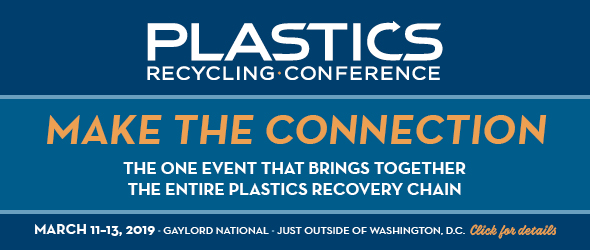Over the last year, China has closed its doors to virtually all recovered plastic imports, leading to turmoil for exporters and others. But are recycling connections between North America and China ending, or simply evolving?
Next month’s Plastics Recycling Conference and Trade Show will feature a presentation from Chris Cui, director of China Programs for Closed Loop Partners. The investment platform, known for supporting the U.S. municipal recycling sector through a variety of financial initiatives, recently launched a project aimed at facilitating Chinese-U.S. business partnerships.
We reached out to Cui for more details.

Chris Cui, Closed Loop Partners
Plastics Recycling Update: Closed Loop Partners recently launched its China Programs. What is this project and what are its goals?
Chris Cui: Under the new age of recycling, we all need to step out of our comfort zone, take a long-term approach, and start working with different stakeholders outside of the U.S. to adjust to the change and win in the long term. There is an urgent need for recycling leaders in the U.S. and China to talk and collaborate. Closed Loop Partners is launching China Programs to build the bridge for industries, investors and regulators in the U.S. and China to collaborate.
China Programs has developed strategic partnerships with public and private players (recycling companies, investors and brands) in China. We have been actively monitoring policy changes and assessing market trends in China with the goal to facilitate conversations and create new business investment opportunities between U.S. companies, investors and their peers in China.
What do you plan to cover in your presentation and what can attendees plan to take away from it.
China’s “National Sword” policy has and will have fundamental and long-lasting impacts to stakeholders in the recycling ecosystem, not only in the U.S. but also in China and the rest of Asia. Instead of responding passively to the fluctuations in commodity price, Closed Loop Partners encourages companies to take a proactive and global approach to seize opportunities arising out of turbulence.
We would like to share our insights on the policies, analyses of trends, and new business opportunities we have seen arising from the market shift. I’ll talk about the latest market intelligence and policy insights to help stakeholders understand the evolving market changes; opportunities for partnerships with public, private and NGO sectors in China; and business and investable opportunities with Chinese companies who are expanding in the U.S.
From your perspective, what does the future of collaboration/business between recycling interests in the U.S. and China look like?
We have seen several successful long-term private-public sector partnerships where U.S. and Canadian businesses that understand the green development needs in China are able to get strong and long-term support from Chinese municipal governments to create circular economy business opportunities. We are also helping the industry in China and rest of Asia on their expansion to North America after the market shift.
What advice do you offer to recycling companies amid the current market disruptions?
Our suggestions are to seize business opportunities out of the changes by taking a collaborative approach with partners in the U.S. and abroad. Companies should equip themselves with the latest developments in innovation, monitor global investment opportunities and policies, and be willing to invest to get a head start for the new age of recycling. Before you make investments in capital expenditure, you should have a global view of where the industry is going.
What makes you most excited to be a part of the recycling industry right now?
Turbulence creates opportunities for those who are prepared. The new age of recycling brings both challenges and opportunities. With the increased interest from global capital market entities (both public and private), it creates a rare opportunity for entrepreneurship and it establishes recycling players to become tomorrow’s champions.
Cui will speak during Plenary Session III: The Evolving Resin Market Landscape, to be held from 8:30 to 10 a.m. on Wednesday, March 13.
Joining her on the stage will be Joel Morales, senior director of polyolefins for North America at IHS Markit, and Tison Keel, senior director for PET, PTA, EO & derivatives at IHS Chemical. The session will be moderated by Don Loepp, editorial director of Plastics News.
See more details on the Plastics Recycling Conference website.


